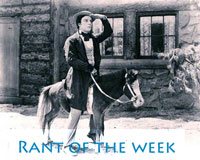
By the way, Chapin doesn't have a great voice, but he puts passion into it, and he takes risks, and he had Big John Wallace with the fabulous five-octave tenor and his cello to give life to his arrangements.
Trivia: Chapin's widow, Sandy, won a $12 million lawsuit against the owners of the truck that rear-ended Chapin's 1975 Volkswagen Rabbit in 1981 resulting in his death. According to the authorities, he may well have suffered a heart attack before the accident and the police investigation showed that he had slowed to 15 mph and was wandering the lanes at the time of the collision. Chapin's license had been suspended at the time for traffic violations. But she still got $12 million? I guess if you rear-end someone, you're going to be at fault no matter what the guy ahead you is doing.
What's wrong with "Mr. Tanner"? "Mr. Tanner" tells us about a man with a good voice who works in a laundry and sings to himself. His friends discover his talent and encourage him to move to New York and go for the big time. He does so. He takes every penny he has and rents a hall and gives a performance but he gets raked by the critics. He returns to his home town shattered and disillusioned. As in "Flowers are Red", Chapin's villains are made of straw and, as Susan Boyle showed, critics are far more likely nowadays to shower praise on mediocre talents than they are to savage good ones.
The flaw with "Mr. Tanner" is that the circumstances of his disappointment are ridiculous: critics don't attend vanity concerts put on by somebody who has never performed publicly anywhere before, and if they did, they would never have reviewed him in the same way they would review professionals. He wouldn't have been "fair game". It's not likely professional critics would even attend a concert presented by an unknown singer without any previous professional credits. And Chapin conspicuously omits a critical component of this scenario: the audience. Either they would have loved him because, in Chapin's scenario, he really is very good, in which case he would have been validated regardless of critical opinion, or they would have booed, thus validating the critics. But that would have eviscerated Chapin's goal of eviscerating the straw-critics.
It tells me that this song is not based on any real experience or first-hand knowledge. If it was, Chapin would have dealt with the problem of the audience.

